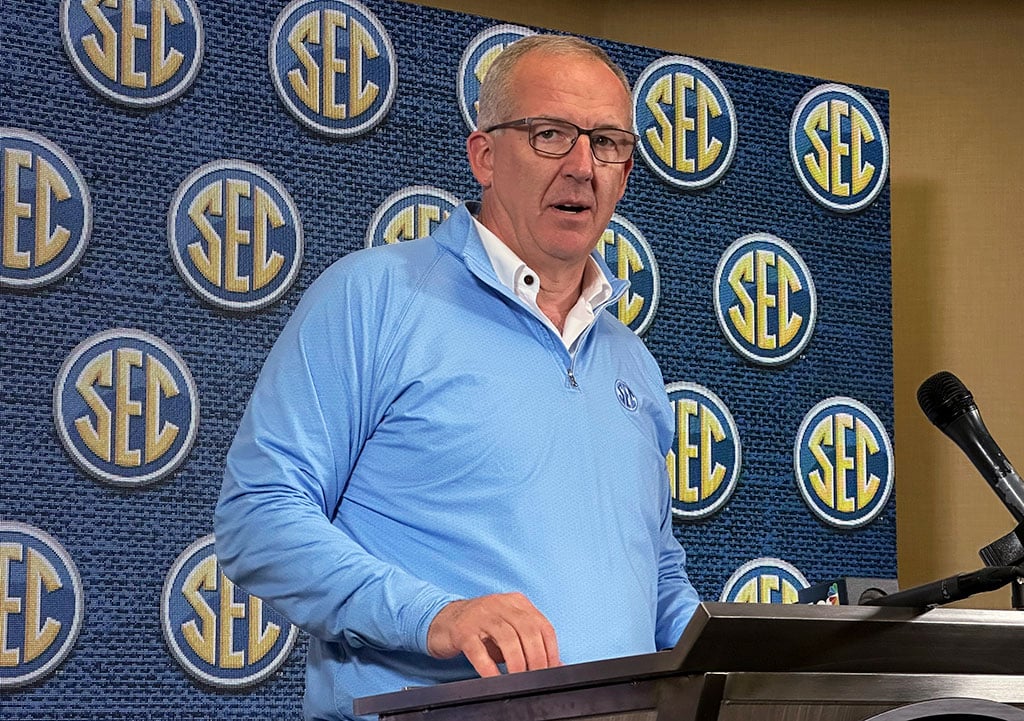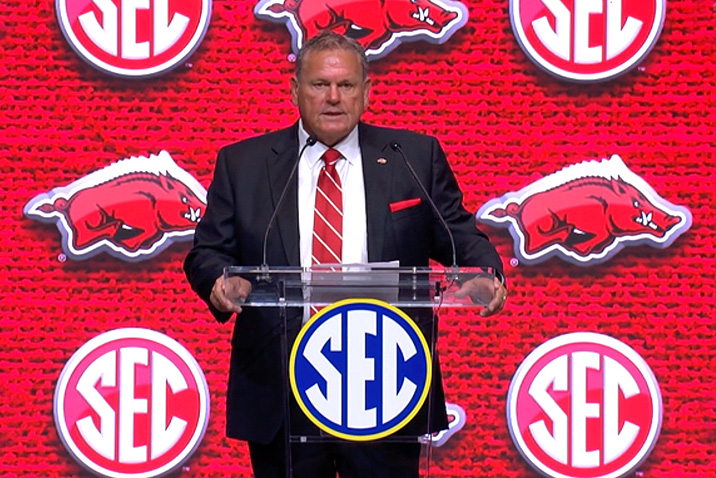 Southeastern Conference Commissioner Greg Sankey speaks to reporters during the conference’s spring meetings, Tuesday, May 30, 2023, in Destin, Fla. (AP Photo/Ralph Russo)
Southeastern Conference Commissioner Greg Sankey speaks to reporters during the conference’s spring meetings, Tuesday, May 30, 2023, in Destin, Fla. (AP Photo/Ralph Russo)It’s never totally quiet on the Razorback on front.
Arkansas’ men’s and women’s track athletes are competing for individual and team titles in Austin, Texas, and recruiting is a 24-hour-a-day, 365-day-a-year process more so now than ever before with rules being relaxed a bit and the freedom that athletes now have to transfer almost on a whim.
Head coaches and assistants — particularly assistants — have never earned their money more than they do in today’s anything-goes world of recruiting. College coaches are paid incredibly well at the Power 5 level, but being an assistant coach is a transient lifestyle. The demand to win and win at a higher level each year is so high that assistant coaches can often become vagabonds, bouncing from job to job over the course of their careers.
Arkansas head football coach Sam Pittman had 17 different stops in his career that dates back to being a graduate assistant at Pittsburg State in 1984 before becoming the Razorbacks’ head football coach in 2020.
Eric Musselman had a bit different tract through the NBA and then into college in his career that began in 1989, but he had 15 stops before becoming the Hogs’ head basketball coach in 2019.
Arkansas is Dave Van Horn’s sixth job as a collegiate baseball coach. He’s held the post since 2003 and it doesn’t feel like he will be giving the job up any time soon. Van Horn started out as a graduate assistant for three years under his Razorback head coach Norm DeBriyn from 1985-88 before steadily moving up the ranks in relatively short fashion. Van Horn was the head coach at Nebraska for five years before winning his way back to Arkansas unpon DeBriyn’s retirement.
While late November and December means the holidays for most everyone else, collegiate coaches are most definitely recruiting during the bulk of that time period but also gladly preparing for a bowl game, or on the other hand, a possible move to another job.
College assistants become used to that kind of chaos, or they get out of coaching, usually long before they earn a shot at an assistant job at the Power 5 level. Some assistants have easier paths than others, but most toil long and hard before earning their break.
At one time, late June through most of July was a time when assistant coaches and head coaches could get a bit of a break. It seems most still attempt to squeeze some vacation time in during that period today, but the changes to transfer, recruiting, and practice rules in recent years and just recruiting in general means coaches are almost always on call or making calls of some sort.
 Arkansas football coach Sam Pittman speaks during NCAA college football Southeastern Conference Media Days, Wednesday, July 20, 2022, in Atlanta. (UA Athletics)
Arkansas football coach Sam Pittman speaks during NCAA college football Southeastern Conference Media Days, Wednesday, July 20, 2022, in Atlanta. (UA Athletics)Now, don’t get me wrong. All people that succeed at a high level in their profession work exceedingly hard and are dedicated. When they walk out of the work place, their work doesn’t just end because they’ve clocked out. No one gets ahead or excels by doing the minimum demanded, at least not for long. It catches up to you.
And, yes, some toil long and hard in every profession without truly gaining the compensation and accolades they might merit. The idea that the world is fair and just is a fairy tale.
However, Pittman is backing a movement to shorten the time the transfer portal is open at the end of the spring semester from 45 to 15 days to ease the work flow for coaches during that hectic time period at the end of the semester. He spoke about the effort at the SEC Meetings in Destin, Fla. earlier this month.
It will be interesting to see what comes of the effort. Since the Supreme Court’s ruling on Name, Image, and Likeness and on transfer rules, it’s been hard to get a consensus among institutions in college football unless there is a great deal of money to be made or saved.
The SEC’s wrangling over whether to go to a nine-game schedule or stay at eight is a case in point. Nine games sounded great to SEC members when it appeared like the programs might gain as much as $5 million each by the move.
However, with Disney and ESPN’s revenue issues taking additional payments for a ninth conference game off the table, the consensus of the league was to stand pat at eight games at least until the new contract is negotiated starting with the 2025 season.
As a fan, I don’t like the idea of an uneven schedule with nine conference games. One season a team will play five home SEC games, but the next year, just four. It’s hard enough to win in the SEC without having the deck stacked against you.
While no one is consulting me, I’d prefer the SEC stay at eight conference games or move to 10 to keep the number of home and away conference games even.
Is home-field advantage that big of a deal?
That’s hard to quantify. I would agree with those that argue it’s more about who you play than where.
However we know oddsmakers generally consider a home team a three-point favorite off the top before calculating at any other factors about a matchup.
If you look at the results of Arkansas’ games last year, four of Arkansas’ six losses were decided by three or fewer points.
In a competitive league like the SEC, three points can mean everything.
The idea of having to play more road games than home games every other year should be concerning to Razorback supporters.

